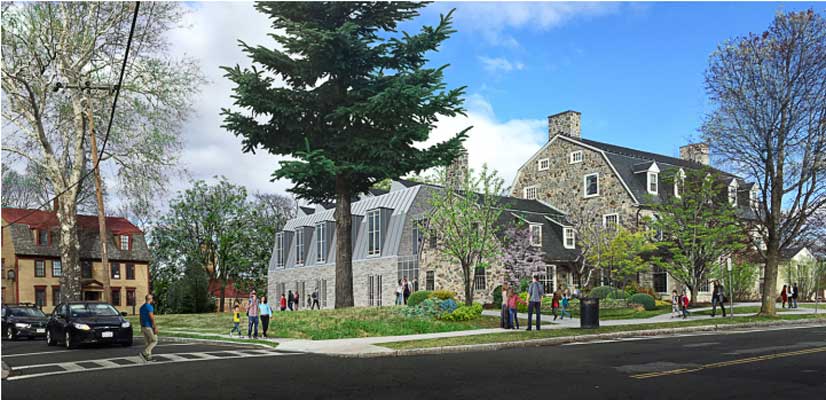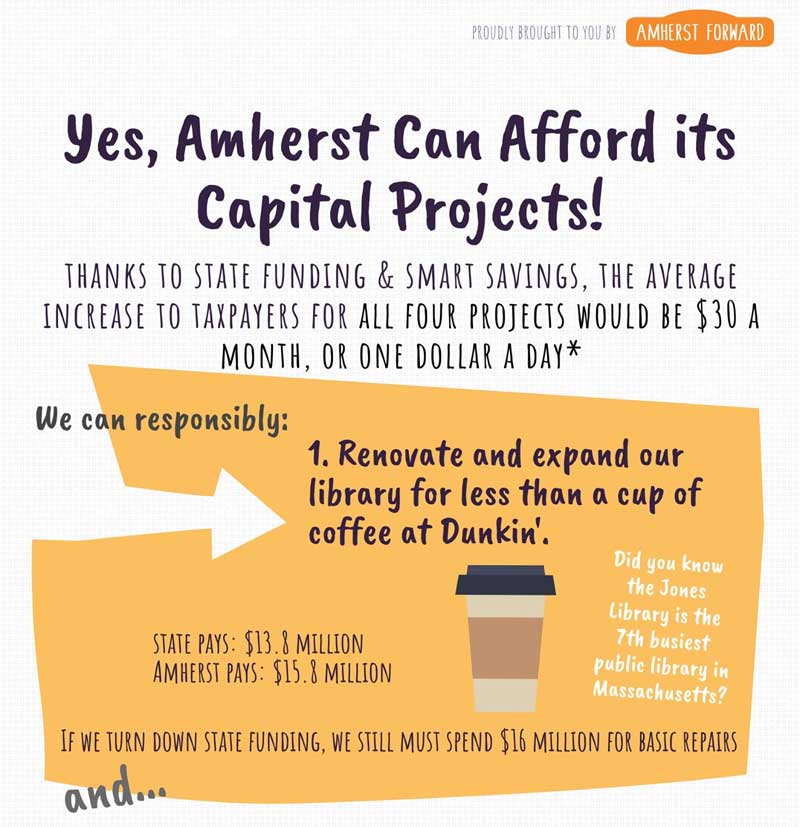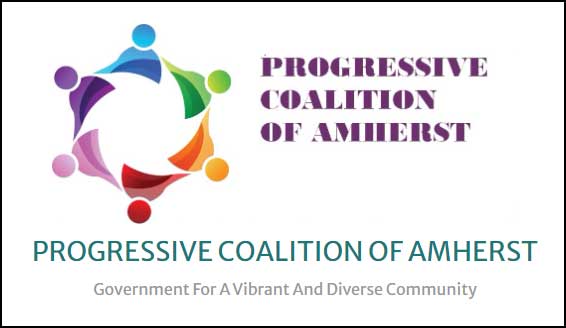Amherst Forward’s Influence Extends To Election Results, Government Policy

Powerful PAC Has Changed The Face Of Amherst Politics
Who Holds the Most Power in Amherst?
Who holds the most power in Amherst? Is it Lynn Griesemer who has been the only council president the town has known since its adoption of the Town Council form of government five years ago?
Is it Andy Steinberg who has served as an at large member of the Town Council and chaired the powerful Finance Committee for the past five years?
Is it Town Manager Paul Bockelman who is the executive branch of Amherst government and who has the sole power to sign town contracts and recommend committee appointments?
An argument can be made that the answer is none of the above, but a coalition of citizens that has organized as a Political Action Committee (PAC) called Amherst Forward (AF). Through a combination of political donations, campaign support, social media blasts and fundraising abilities, AF has for several years succeeded in influencing Amherst election results and budget priorities.
To understand Amherst Forward’s methods, we have examined archives of its website, past Facebook posts, and the Town’s file of Campaign Finance Reports.
Organized in Opposition to Town Meeting
Amherst Forward’s Facebook presence goes back to at least August 2015, when the group announced the beginning of “the charter reform movement” which aimed to form a charter commission to recommend modifications to Amherst’s Town Meeting form of government. At about the same time the group hailed the formation of an allied PAC with the immodest name Amherst For All (AFA) that sought to “improve” Amherst’s government structure.
See related Is ‘Amherst for All’ shape of things to come? (Amherst Bulletin)
Through an energetic and well-organized campaign, large newspaper ads featuring the names of hundreds of supporters, and help from the Daily Hampshire Gazette which came out with an editorial in favor of eliminating Town Meeting, AF and AFA succeeded in achieving their vision of a new form of government. After a March 2018 town-wide vote, Amherst’s legislative branch consisting of 252-member Town Meeting and its executive branch represented by a 5-member Select Board were replaced by a 13-member Town Council serving as the legislative branch and an unelected Town Manager reporting to the Council as the government’s executive branch.
Amherst Forward Presses Its Library Agenda
By October 2018, Amherst Forward had named Katherine Appy and Ginny Hamilton as co-chairs, MaryAnn Grim as treasurer, and had established a 10-person leadership team. Four leaders – Hamilton, Kent Faerber, Matt Blumenfeld and Claudia Canale-Parole – were or would become actively involved in the Jones Library Capital Campaign to raise money for a Jones Library renovation-expansion project that would require $15.8 million plus $9 million in borrowing costs to be contributed from the Town’s tax-supported capital budget. Hamilton, Blumenfeld and Canale-Parole have acknowledged receiving compensation from the Capital Campaign/Library for their services. A fifth leader, Farah Ameen, is currently a library trustee.
Town funding would require a two-thirds vote of the new Town Council to authorize borrowing $35.3 million to cover the total library project cost. Campaign finance records show that Amherst Forward set to work to ensure that Town Councilors who were favorable toward library funding were elected.
In 2018 future Town Council President Lynn Griesemer received an AF in-kind contribution of $120.19 to cover a flyer, postcards and a Facebook ad, while Library Capital Campaign co-chair Lee Edwards donated $100 to Griesemer’s election campaign.
In September 2018, future Finance Committee chair Andrew Steinberg reported receiving three $100 contributions, including one from Edwards and one from her co-chair and AF leader Kent Faerber. Steinberg reported an in-kind contribution similar to Griesemer’s of $120.19 from AF for flyers, postcard mailers and Facebook ads. He also reported spending $632.40 on a Gazette newspaper ad.
In the run-up to the inaugural Town Council election of 2018, AF sent out questionnaires to council candidates asking about support for various issues including the library project. It endorsed 14 candidates and provided them with campaign assistance. Support included web space on amherstforward.org, social media ads, help producing campaign materials, and advocacy on its 1200-follower Facebook feed.
See related Amherst Forward claims it will not act as a PAC, opponents skeptical (Daily Hampshire Gazette)
The endorsements bore fruit as Amherst Forward saw eight of its endorsed candidates elected to the 13-member Town Council – Alisa Brewer, Mandi Jo Hanneke, Andrew Steinberg, Lynn Griesemer, George Ryan, Evan Ross, Stephen Schreiber and Shalini Bahl-Milne. All eight voted to approve the $35.3 million Library borrowing authorization and were joined by Pat DeAngelis (endorsed by AF in the 2021 Town Council election) and Dorothy Pam who later voted against continued funding for the library project after its estimated cost ballooned to nearly $50 million. Only independent candidates Darcy Dumont, who described the library project as “a want not a need” and Sarah Swartz who expressed concern for middle income residents who could not afford Amherst’s high property taxes voted against the borrowing. Cathy Schoen who had not been endorsed by AF abstained, citing financial risk to the Town.

2022 MBLC statistics list the Jones Library as 99th in the state in visitors per sq. ft.
Amherst Forward Remains Actively Promoting Its Candidates in 2023 Local Election
Amherst Forward remains committed to the Jones Library renovation-expansion despite cost estimates currently exceeding the town appropriation by $10 million. It has endorsed 12 candidates for Town Council, including pro-library-project-funding incumbents Lynn Griesemer, Andrew Steinberg, Mandi Jo Hanneke, Pat DeAngelis, Anika Lopes and Ana Devlin Gauthier.
With Library Project cost estimates now far exceeding the April 2021 borrowing authorization, the Town Council will need to vote for an increase in the funding amount if the project is to continue to the construction phase in early 2024. This will come after the AF-dominated Council rejected a proposal from Town Councilor Ellisha Walker to spend $5 million from reserves to reduce the size of a debt exclusion for the new Fort River School that is now estimated to add an additional $451 to the average homeowner’s property tax bill each year for the next 25 years.
See related Walker’s Pleas To Ease Taxpayer Burden Of School Override Fall On Deaf Ears
Amherst Forward believes that Amherst has been “kicking the can down the road” and feels that a small Town Council is better equipped to make important decisions that will bring Amherst real progress unimpeded by a large and diverse Town Meeting or a noisy, sometimes complaining public.

In 2021 Amherst saw an alternative PAC formed called Progressive Coalition of Amherst (PCA). The group describes itself as striving for a “more democratic and diverse” town government, and stresses among other goals the importance of climate action. PCA has endorsed four candidates for Town Council and four who are running for School Committee. It points out that all its recommended candidates have accepted the PAC’s endorsements.
See related Amherst council candidate expresses ‘disbelief’ in endorsement (Daily Hampshire Gazette)
Voters will be able to express their candidate choices in the November 7, 2023 town-wide election.

Actually, Amherst Forward’s origins go back to 2006. Sustainable Amherst came onto the political scene for the 2006 town elections, asserting that many Town Meeting candidates were faceless entities, unknown to most of their constituents, and perhaps not working in their best interests. Their campaign was effective: Many long-time Town Meeting members lost their seats. But there was a surprising benefit to all this: Determined to regain our seats in 2007, those of us in the former Precinct 9 began to organize as a group and to conduct our own door-to-door campaigns. Our faces, our names, and our perspectives became known in our neigborhoods. We continued to do this for the following decade.
But Sustainable Amherst was not done. To their way of thinking, both your face and your voting record should be public. Thus was born tallyvotes.org, an online database of Town Meeting tally votes — the ones counted and recorded by individual member. This was actually a good thing, though when the reason behind someone’s yes or no vote is missing, so is important nuance.
But Sustainable Amherst wanted more than just making members’ votes public: It wanted to make public where you stood according to their criteria. So members were ranked on whether or not their tally votes matched what Sustainable Amherst had determined would be in the best interests of the town. Did your votes all agree with theirs? You were given a rating of “stellar.” Did your votes go the other way? Ah, the lower down on the ranking you got, well, no more need be said. I must confess some of us found this to be quite inspiring, and looked forward to getting an increasingly negative rating from the group.
Others were not amused, however, and complained about what frankly was behavior that would be more expected from some eighth-grade clique, so eventually the rankings disappeared from the website — or at least from the public eye. In the meantime, Town Meeting, thanks to the Town Meeting Coordinating Committee, did try to respond to criticism with new measures to be more efficient, more transparent, more diverse, and more responsive.
It didn’t matter, because Sustainable Amherst, and its later iterations, had as their goal the elimination of Town Meeting. At the end, we were branded as old, white, rich, and out of touch. It didn’t matter that on the most decisive vote in town — that to approve or not the “mega-school” — Town Meeting’s votes mirrored almost exactly those of registered voters who came out to the polls. Town Meeting had to go, because it had failed to embrace the “or you’re with us, or you’re against us” mentality of what was now Amherst for All.
I guess that’s “All,” as long as you agree with them. Otherwise, you’re on your own.
Thanks for that background, Denise. If memory serves, the group/PAC was called “Amherst For All” until sometime around July 2018, a few months after the charter vote that replaced Town Meeting.
In October 2018, the Amherst For All Facebook page changed name and logo to Amherst Forward, which allowed the group to retain all of the followers and likes rather than starting from scratch. There was some kind of handover of leadership and of Facebook page management from those previously associated with AFA to those at the helm of Amherst Forward.
With a seeming focus on downtown development and easing zoning regulations, AFA leadership over the years included Adam Lussier, Jerry Guidera, Clare Bertrand, Andy Churchill, Baer Tierkel, Yuri Friman, Amy Gates, MaryAnn Grim, Aaron Hayden, Bernie Kubiak, Niels LaCour, Ellen Lindsey, Julie Marcus, Jonathan O’Keeffe, Steve Schreiber, Greg Stutsman, Michael Alpert, Becky Demling, Bryan Harvey, Taryn La Raja, Jonathan O’Keeffe, Richard Roznoy, Susan Roznoy, Peter Vickery, Nina Wishengrad. Johanna Neumann chaired the campaigns for the school vote in 2017 and for the charter vote in 2018.
Amherst Forward leadership seemed to grow more from the previous school vote. Its leadership has included Katherine Appy, Ginny Hamilton, MaryAnn Grim, Farah Ameen, Matt Blumenfeld, Claudia Canale-Parola, Andy Churchill, Kent Faerber, Bennett Hazlip, Jan Klausner-Wise, Sarah Marshall, Karla Rasche, Heather Sheldon, Rabia Ahmed, Clare Bertrand, Laura Draucker, Adi Heller, Anastasia Ordonez.
Many of these names will be familiar to those of you that follow Amherst town politics and campaigns.
In this upcoming campaign, I believe one of the new candidates for Jones Library Trustee, Eugene Goffredo, is the spouse of Ginny Hamilton. Hamilton is a former Amherst Forward co-chair and is the current Campaign Manager of the library’s Capital Campaign for the renovation/expansion project. Goffredo is, predictably, endorsed by Amherst Forward, and is an eager supporter of the expansion project.
Taxpayers are presumably footing the bill for Hamilton’s Campaign Manager salary since the Memorandum of Agreement between the town and the Library Trustees allow the Trustees to deduct “any direct and reasonable fundraising costs and expenses” from the Library’s share of the project. Last I looked the fundraising expenses were at $256,814 (as at 9/1/23). I can think of a number of things I would rather see the town spend a quarter of a million dollars on.
Today the September Jones Library Capital Campaign Report was released and the campaign had a fairly good month with community gifts and pledges totaling $42,601. However, nearly half of that — $20,324 — was spent on “Campaign Personnel Expenses.” The Town and Library aren’t the only parties benefitting from building project fundraising.